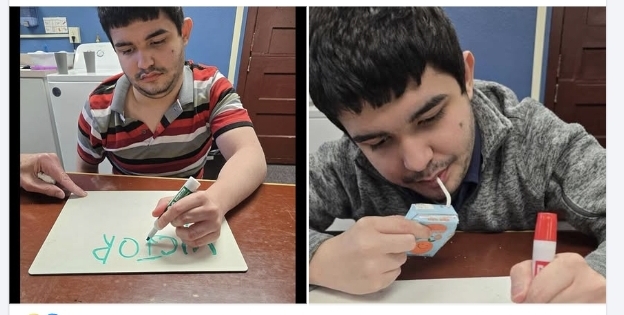
In a quiet Pocatello, Idaho neighborhood, a family’s desperate hope for help turned into a nightmare on the evening of Saturday, April 5, 2025. Victor Perez, a 17-year-old boy with autism and cerebral palsy, now lies in a coma at Portneuf Medical Center, his life hanging by a thread after being shot nine times by police. The teenager, described by his aunt Ana Vazquez as having the mental capacity of a five-year-old, has undergone three surgeries, including the amputation of his left leg. His family, reeling from shock and grief, insists Victor needed compassion and support—not the hail of bullets that left him critically injured.
The incident unfolded around 5:20 p.m. when Brad Andres, a local auto shop owner, stepped outside to take a phone call and noticed a disturbance in a nearby yard. His 19-year-old son, Bridger, dialed 911, reporting what he believed was a domestic dispute. In the call, later released by the Pocatello Police Department, Bridger described a young man—later identified as Victor—wielding a kitchen knife, appearing intoxicated, and intermittently chasing two adults. “He seems pretty drunk,” Bridger told the dispatcher. “He’s just running at them with a knife and then falling over. I think he just stabbed himself, actually.” He noted the individuals weren’t speaking English and that Victor eventually collapsed, seemingly unconscious.
Within minutes, at approximately 5:25 p.m., four Pocatello police officers arrived at the scene on the 700 block of North Harrison Avenue. Video footage captured by Andres shows them rushing toward a chain-link fence separating them from Victor, who was lying on the ground. Three officers drew handguns, while a fourth aimed what appeared to be a shotgun. They shouted commands for Victor to drop the knife. Instead, the teenager, unsteady on his feet due to his physical disabilities, stood up and took a few steps toward them, still holding the weapon. In less than 15 seconds from their arrival, the officers opened fire, striking Victor multiple times.
Victor’s family paints a starkly different picture of the teen than the chaotic scene described in the 911 call. Ana Vazquez explained that Victor, who is nonverbal and intellectually disabled, was not drunk but struggling with a behavioral episode tied to his conditions. His staggering gait, mistaken for intoxication, stemmed from cerebral palsy, which severely limits his mobility. She recounted how Victor’s grandfather tried to intervene, pleading with officers not to shoot, while his 16-year-old sister screamed that he was “special.” Amid the chaos, no police interpreter was present, forcing Vazquez to translate her family’s anguished cries for the officers, who appeared focused solely on neutralizing what they perceived as a threat.
The aftermath has ignited outrage across Pocatello and beyond. Dozens of residents gathered outside the police department on Sunday, April 6, holding signs demanding accountability and questioning why lethal force was used so swiftly. Andres, still shaken, told reporters the officers acted like a “firing squad,” never attempting to assess the situation or de-escalate it. “This wasn’t a dangerous situation,” he said. “He wasn’t chasing anybody, and everyone could have stayed out of reach. My son called for help, not for this.” The video, widely circulated online, has fueled public fury, with many asking why non-lethal options—like Tasers or pepper spray—weren’t employed against a clearly impaired teenager.
Pocatello Police Chief Roger Schei addressed the growing unrest in a press conference on Monday, April 7. He played the 911 call and displayed a photo of the knife Victor held, defending his officers’ actions. “In situations like this, officers must make decisions in seconds,” Schei said, emphasizing the perceived threat to both the police and bystanders in the yard. He acknowledged the video but cautioned it showed only one perspective, urging patience as the East Idaho Critical Incident Task Force investigates. The department has remained tight-lipped since, declining further comment until the inquiry concludes.
For Victor’s family, the wait for answers is unbearable. Doctors have revived him twice, and tests on his brain function are pending. “We don’t know if he’ll wake up,” Vazquez said, her voice heavy with sorrow. She described Victor as a gentle soul who loved police officers, often watching shows about law enforcement with childlike fascination. The irony is not lost on her—that the very people he admired may have ended his future. As Perez fights for his life, a candlelight vigil is planned for Saturday, April 12, outside the hospital, while a petition demanding a transparent investigation has garnered thousands of signatures. In Pocatello, a community grapples with grief, anger, and a pressing question: Could this tragedy have been prevented?